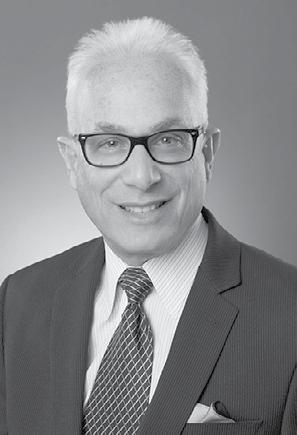
3 minute read
The Importance of Mental Health Care for Seniors
By Howard Olshansky, JFS Executive Director

When we think about the challenges facing our senior community, we think about their health challenges, especially as they are living longer, their financial struggles, especially for the many living on fixed incomes, and the potential for them to become socially isolated, especially as they become less mobile. We don’t, however, often think about their mental health. Did you know people 85 and older have the highest suicide rate of any age group? According to the World Health Organization, the following are key facts related to seniors and mental health:
- At least one in four older adults experience some mental disorder, such as depression, anxiety, or dementia.
- Due to population aging, the number of seniors with mental disorders is expected to double by 2030.
- Depression is the most common mental health problem in older people.
- Two-thirds of seniors with mental health problems do not get the treatment they need (the “treatment gap”).
- Mental health services for older adults are extremely limited in most countries in North and South America.
Through a recent data study collected by the CDC, the results of the CDC’s Behavioral Risk Factor Surveillance System, implemented in all 50 states, found that in North Carolina close to 15% of adults aged 50 or older experienced frequent mental distress in the past 30 days. Frequent mental distress (FMD) may interfere with major life activities, such as eating well, maintaining a household, working, or sustaining personal relationships. FMD can also affect physical health.
One of the ongoing problems with diagnosing and treating mental illness in seniors is the fact that older adults are more likely to report physical symptoms than psychiatric complaints. In fact, many seniors may not even recognize their own mental health issues. In addition, according to an article in Health In Aging, “Due to stigma, misinformation, and false beliefs about aging, older adults frequently go without adequate care for depression and other psychiatric illnesses and psychological problems. Too often, doctors offer prescription drugs as a cure-all solution, and fail to address the overall mental health and well-being of the older patient. Research shows that older adults are often less comfortable seeking care from a mental health professional than their younger counterparts due to the historical shame and ignorance surrounding mental illnesses.”

According to Daniel D. Sewell, MD of UC San Diego Medical Center, “Addressing mental health issues in older
populations requires paying more attention, not less. Family members should seek professional advice if they believe their elderly loved one may be experiencing mental health problems.” Family members, however, should not be the only ones paying attention to seniors’ need for mental health support. In fact, family members are often too close to the situation to identify the issue. They are often taking on a caregiver role and become so overwhelmed with managing day-to-day that they don’t see the emotional toll being experienced by their loved one. Our seniors, however, are often engaged within the community. They attend events and play Mah Jongg, bingo, and cards. They go to the hairdresser, nail spa, and gym. They attend religious services. Often those around them may comment that so and so seemed off today or hasn’t been him or herself lately.
Below are some red flags to pay attention to that might indicate a senior needs mental health support:
- Changes in appearance or dress, or problems maintaining the home or yard

- Confusion, disorientation, or other problems with concentration or decision-making
- Decrease or increase in appetite; changes in weight
- Depressed mood lasting longer than two weeks
- Feelings of worthlessness, inappropriate guilt, helplessness; thoughts of suicide
- Memory loss, especially recent or short-term memory problems
- Physical problems that can’t otherwise be explained: aches, constipation, etc.
- Social withdrawal, or loss of interest in things that used to be enjoyable

- Trouble handling finances or working with numbers
-Unexplained fatigue, energy loss, or sleep changes
These are all signs that might indicate a mental health issue for an individual of any age. However, with seniors we have a tendency to just attribute the behaviors to “old age.” As a community, we need to pay attention to these signs and explore what may be going on. Ask them if they are OK. Talk to their family member and acknowledge what you have been observing. Let them know you’re not being nosy, just concerned.
If you know of a senior who is in need of mental health support, Jewish Family Services is ready and available with services. Please reach out to JFS at (704) 364-6594.









